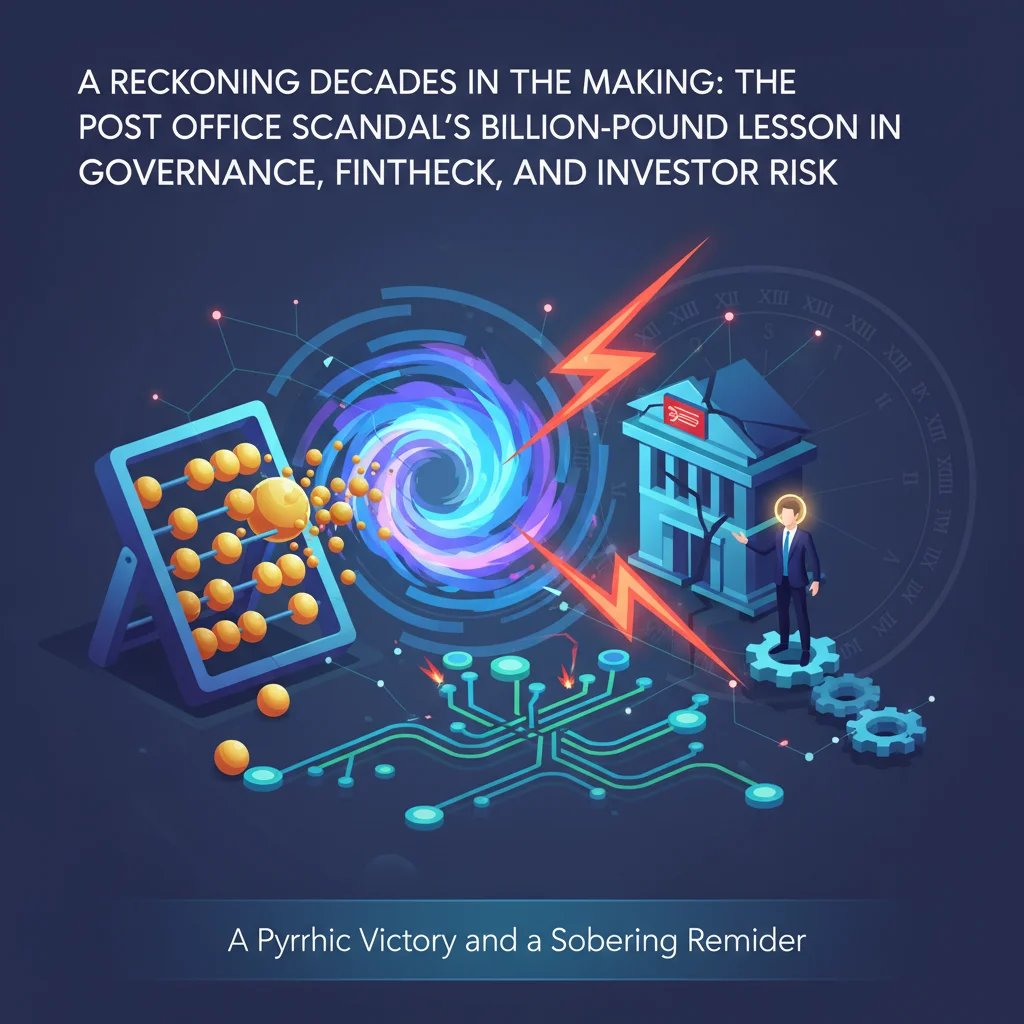
A Reckoning Decades in the Making: The Post Office Scandal’s Billion-Pound Lesson in Governance, Fintech, and Investor Risk
A Pyrrhic Victory and a Sobering Reminder
The recent news that Sir Alan Bates, the tenacious leader of the Justice for Subpostmasters Alliance, has finally reached a settlement with the Post Office marks a pivotal moment in one of the most profound miscarriages of justice in modern British history. For over two decades, Bates championed the cause of 555 subpostmasters who were wrongfully accused of theft, fraud, and false accounting due to a faulty IT system. While the settlement brings a measure of personal closure, the saga itself serves as a stark and costly cautionary tale for the entire global business community. It’s a story that transcends headlines, offering critical lessons in corporate governance, the perils of flawed financial technology (fintech), and the hidden risks that can lurk within the stock market for unwary investors.
This wasn’t a simple accounting error; it was a catastrophic failure of technology, leadership, and ethics that destroyed lives, bankrupted families, and has now left the British taxpayer with a compensation bill expected to exceed £1 billion. For business leaders, finance professionals, and investors, ignoring the lessons from the Post Office Horizon scandal is a luxury no one can afford in today’s technologically driven economy.
The Anatomy of a Corporate Catastrophe: The Horizon Scandal Explained
To grasp the magnitude of the fallout, one must first understand the mechanism of the failure. In 1999, the UK Post Office rolled out a new accounting and sales software called Horizon, developed by the Japanese tech giant Fujitsu. This system was intended to streamline operations for thousands of local subpostmasters—essentially franchisees running local post office branches.
Almost immediately, subpostmasters began reporting inexplicable shortfalls in their accounts. The Horizon system was showing discrepancies, suggesting money was missing when it wasn’t. When they raised the alarm, they were met with a wall of denial. The Post Office, armed with contractual clauses that made subpostmasters liable for any shortfalls, took a draconian stance. It asserted that the Horizon system was “robust” and infallible, and therefore, the shortfalls must be the result of theft or incompetence.
What followed was a campaign of legal intimidation on an industrial scale:
- Over 900 subpostmasters were prosecuted between 1999 and 2015.
- Hundreds were imprisoned, financially ruined, and socially ostracized.
- Many lost their homes, their life savings, and their health. Several suicides have been linked to the scandal.
The core of the issue was a complete breakdown in the relationship between a large corporation and its operational partners, underpinned by a blind, unshakeable faith in a flawed piece of financial technology. This blind faith allowed a culture of blame to fester, with devastating human and economic consequences.
The Staggering Financial and Human Cost of a Flawed Algorithm
The true cost of the Horizon scandal is measured in both ruined lives and staggering financial liabilities. The economic fallout provides a clear case study for any C-suite executive or investor on the long-tail risk of technological and governance failures.
Here is a summary of the devastating impact, which continues to mount as the full scope of the compensation required becomes clear.
| Metric | Figure/Statistic |
|---|---|
| Wrongful Prosecutions | Over 900 |
| Original Group Litigants | 555 (led by Alan Bates) |
| Convictions Overturned | Over 100 to date, with hundreds more under review (source) |
| Estimated Total Compensation Bill | £1 billion+ (funded by the UK taxpayer) (source) |
| Initial Settlement (2019) | £58 million (most of which was consumed by legal fees) |
This financial black hole, ultimately filled by the UK government (the Post Office’s sole shareholder), is a direct result of institutional denial. Had the Post Office and Fujitsu acknowledged the system’s flaws early on, the cost would have been a fraction of what it is today. This illustrates a crucial principle in finance and investing: addressing operational risks head-on is always cheaper than covering them up. The compounding interest of a lie is always reputational and financial ruin.
A Case Study for Investors: Governance, Reputational Risk, and the Stock Market
While the Post Office is state-owned, its primary technology partner, Fujitsu, is a publicly traded company on the Tokyo Stock Exchange. The scandal has had a tangible impact on its reputation and raises critical questions for investors. The company has since apologized and pledged to contribute to the compensation scheme, but the damage is done. For investors, this saga highlights several key risks:
- Vendor and Supply Chain Risk: Companies are increasingly reliant on third-party technology. An investor analyzing a business must also analyze the integrity and reliability of its key suppliers. The failure of Fujitsu’s Horizon system became the Post Office’s failure, demonstrating how deeply intertwined these risks are.
- “Black Box” Technology Risk: The Horizon system was a “black box.” Subpostmasters couldn’t see how it worked, and the Post Office used this opacity as a weapon. For investors in the fintech or banking sectors, it’s crucial to ask how transparent a company’s core technology is. Is it auditable? Is there a clear process for addressing errors? A lack of transparency is a significant red flag.
- The High Cost of Poor Governance: The scandal revealed a complete failure of board oversight. Executives ignored mounting evidence of a problem for over a decade. This is a governance failure of the highest order, and it underscores why a strong, independent board with the courage to challenge executive management is essential for long-term value preservation.
Beyond the Cockpit: Deconstructing the UK-Turkey Fighter Jet Deal and Its Economic Shockwaves
Could Modern Financial Technology Have Prevented This?
It’s tempting to view this as a legacy tech problem, but the core issues of trust, transparency, and data integrity are more relevant than ever in the age of AI-driven trading and decentralized finance. This raises an interesting question: could modern technology paradigms, like blockchain, have prevented or mitigated this disaster?
In theory, yes. The fundamental promise of blockchain technology is a decentralized, immutable, and transparent ledger. Let’s consider the implications:
- Shared, Verifiable Record: Instead of the Post Office’s central server being the single source of truth, a blockchain-based system could have created a shared ledger where both the subpostmaster and the Post Office see the same transaction data simultaneously. Any alteration or discrepancy would be immediately visible to all parties.
- Immutability and Auditability: Transactions recorded on a blockchain cannot be altered or deleted. This would have made it impossible for “phantom” transactions to appear without a verifiable origin, and it would have provided a clear, unchangeable audit trail for investigators to follow.
- Removing the Intermediary of Trust: The entire scandal was predicated on the Post Office forcing subpostmasters to trust its system implicitly. A distributed ledger system, by its nature, is “trustless.” It doesn’t require you to trust a central authority because the integrity of the data is maintained and verified by the network itself.
This is not to say blockchain is a magic bullet for all banking and fintech challenges. But the conceptual framework it offers—one of radical transparency and distributed trust—stands in stark contrast to the opaque, centralized power structure that allowed the Horizon scandal to unfold. It highlights the direction that financial technology must take to build genuine trust with its users.
The Pet Economy Paradox: Why Soaring Vet Bills Are a Critical Indicator for the Modern Investor
The Road Ahead: A Reckoning for the Entire Economy
Sir Alan Bates’ settlement is not an end. It is, perhaps, the end of the beginning. The public inquiry continues, the full compensation bill is yet to be settled, and the question of corporate and individual accountability remains unresolved. The lessons, however, are already crystal clear for anyone operating in the modern economy.
For business leaders, it’s a mandate to foster a culture where problems can be reported without fear of retribution. For technology developers, especially in fintech, it’s an ethical imperative to build systems that are transparent, auditable, and fair. For investors and finance professionals, it’s a permanent reminder that a company’s greatest asset is its integrity, and its greatest liability is a lie. The Post Office scandal was a perfect storm of technological failure, corporate hubris, and human tragedy—a storm whose aftershocks will reshape our understanding of risk, governance, and justice in the digital age.


